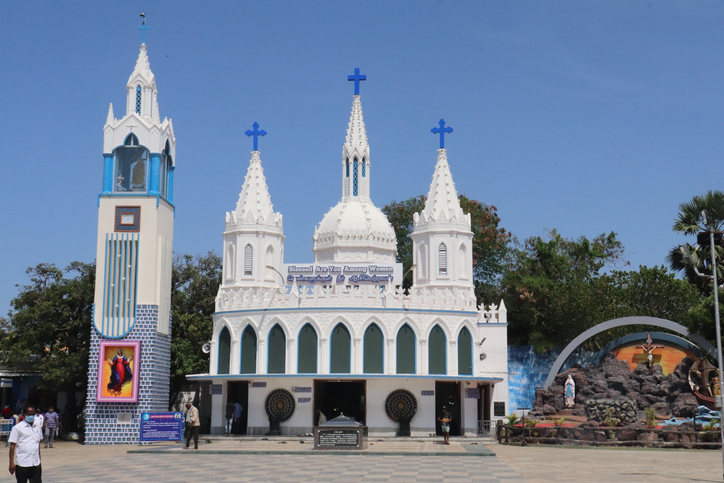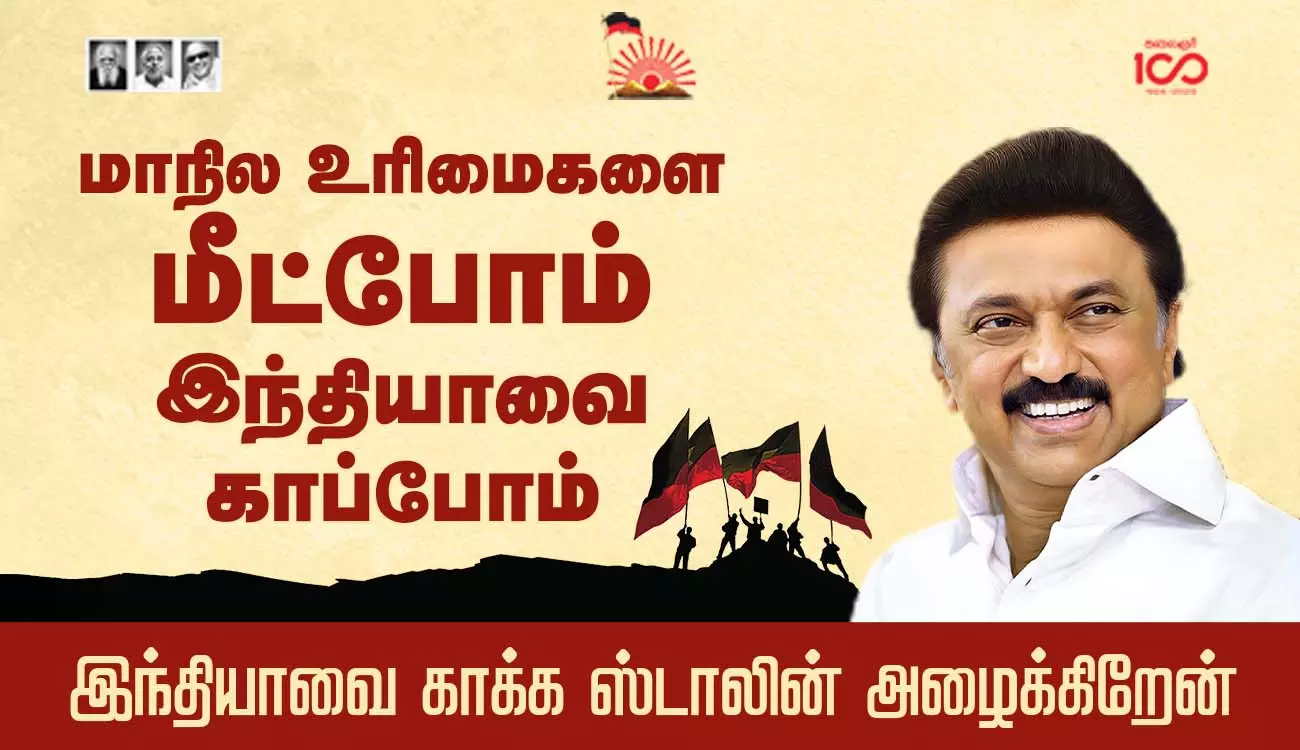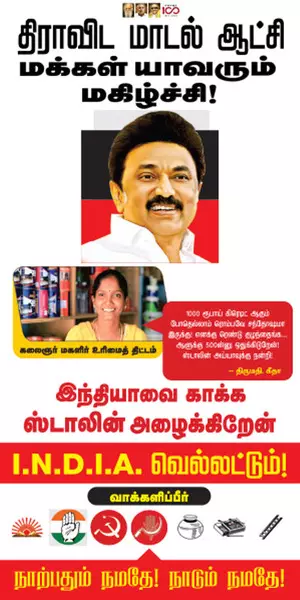
Why Dalit Christians are happy with Tamil Nadu Assembly resolution on reservation

Christian organisations have hailed a resolution passed with overwhelming numbers by the Tamil Nadu assembly urging the Centre to include Christian Dalits in the SC list so that they too enjoy the benefits of reservation.
Christian activists say the decision of the DMK and AIADMK, otherwise long-standing political foes, to join hands in passing the resolution is only a logical extension of the Dravidian ideology that stands for social justice.
“We don’t see this resolution moved by Tamil Nadu Chief Minister MK Stalin through the prism of politics as accused by one political party. Instead, we look it as an extension of the social justice plank,” J Amirtha Lenin, coordinator, All India Catholic University Federation, Loyola College, Chennai, told The Federal.
“You have to see this as part of a long-time struggle of Dalits fighting for their rights to be recognised as Scheduled Caste even after converting to other religions. This resolution will help build pressure on the Centre as leaders like Thol Thirumavalavan have raised this issue in Parliament pointing out how unconstitutional it is to refuse the Dalit status just because of the conversion,” said Lenin, a professor with Loyola College.
BJP questions move
BJP members walked out of the Tamil Nadu Assembly on Wednesday against the resolution. “When a committee headed by former Justice KG Balakrishnan is looking into the issue, what is the need for a resolution? Is the government indirectly endorsing the existence of caste-based discrimination even after conversion?” asked BJP leader Vanathi Srinivasan.
The BJP said the Supreme Court is hearing the matter on according Christian and Muslim Dalits SC status.
Dalit activists point out that justice delayed amounts to justice being denied. The case has been going on from 2004. It was advocate Franklin Caesar Thomas who pleaded with the apex court that his “constitutional rights” had been denied by not extending SC status to all converted Dalits. Various other organisations impleaded themselves in the case.
Bringing in a new committee under former Justice Balakrishnan appears to be a delaying tactic, said Lenin. “Multiple committees appointed by the government including the recent 2007 Ranganath Mishra committee have held that discrimination carries on even after converting into Christianity and to extend SC reservation to them too. How many more committees are we going to see?”
The BJP government at the Centre has rejected the recommendations of the Mishra commission and argued that the Supreme Court should act once the KG Balakrishnan committee files its recommendations. Even the Supreme Court lamented the 20-year delay in taking a call.
Post-conversion bias
Christians, the biggest chunk of minorities in Tamil Nadu with a population of 6.12 per cent as per the 2011 census, do go through caste-based discrimination even after conversion, said M Bharathan, Director of Human Rights Education and Protection Council.
“The sad state of affairs of Christian churches are proof. In a town named Vembar in Thoothukudi district there are three churches: one for the fishermen community, another for Nadar community and a third one for the converted Dalits. The communities have separate graveyards too, which show how the discrimination carries on despite embracing Christianity,” he told The Federal.
In 2008, Christians belonging to Vanniar community allegedly unleashed violence against Dalit Christians in Eraiyur near Villupuram, vandalizing houses and properties of Dalits. The issue that sparked the trouble was the Sagaya Matha Chapel that Dalits built. Dalits accused people from Vanniyar caste of ill-treating them and forcing them to build their own church. Police resorted to firing to quell the violence, killing two people.
Among the bigger states of India, Tamil Nadu has the maximum number of Christians. Kerala tops the list with 18.28 per cent Christians.
Dalit activists say it is an irony that the Central government gave SC status to Dalits who converted into Sikhism in 1956 and those who embraced Buddhism in 1990 but is hesitant vis-a-vis Christian and Muslim converts.
“They (Centre) are wary of extending SC reservation benefits to Christians and Muslims using an alibi that conversions will weaken Hindu religion. But extending one set of benefits to Sikh and Buddhist Dalits and refusing the same to others amounts to discrimination, which is against the basic tenets of the constitution,” Lenin told The Federal.
As of now, Dalits converted to Christianity or Islam are treated as Backward Class instead of Scheduled Caste.
Similar moves by other states
Dalit activists point out that this is not the first resolution pushing for SC status to all converted Dalits. “Andhra Pradesh and Telangana too have passed similar resolutions. Also, leaders like Karunanidhi and Jayalalithaa had written to the Centre making the demand. Unfortunately, the Central government, which has the sole prerogative to notify castes into scheduled list, isn’t acting on them,” said Lenin.
As per the Constitution, the President will notify castes to be included in the SC list as per recommendations of the Centre.
Dalits go through unique challenges even after conversion which cannot be brushed aside, said Bharathan. “For instance, in the Palayamkottai Diocese, the Christian community is demanding 30 per cent reservation in jobs in the diocese. They have got education with the help of Christian institutions. But when they go for job, they allegedly face discrimination. It’s the same case with many dioceses. So, it is time to extend reservation benefits availed by Dalits in Sikhism or Buddhism to Christian and Muslim Dalits as well,” he said.
The BJP is opposed to this. According to Dalits, the party fabricated lies about “forced conversions” at Michaelpatti in Thanjavur last year. “But they failed because of the syncretic culture of the state which binds minorities with the rest,” Bharathan said.
Similarly, allegations by the Tamil Nadu BJP leaders that a girl killed herself in a Christian school as she was forced to convert proved to be false.
“There were waves of conversions into Islam from the 1940s in Tamil Nadu, which got the attention of the nation with the 1981 Meenakshipuram mass conversion. Even though Islam doesn’t encourage casteism, Meenakshipuram Dalits are still marrying people from other Dalit Muslim communities. Only those who converted in the 1940s are slowly getting assimilated into the mainstream of the Muslim community. If this is the case with Islam which is comparatively caste-free, think of the predicament of Dalits converted to Christianity? We need more empathy towards their tragic situation,” said Bharathan.





